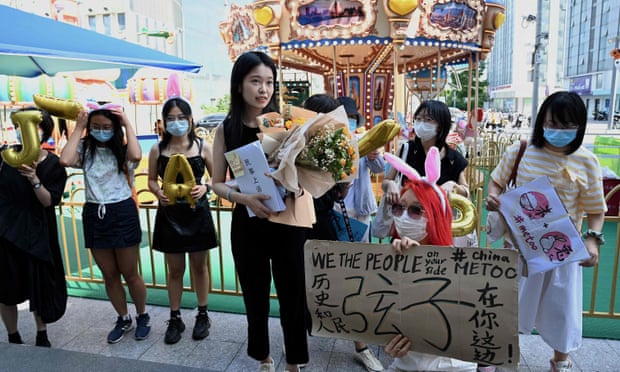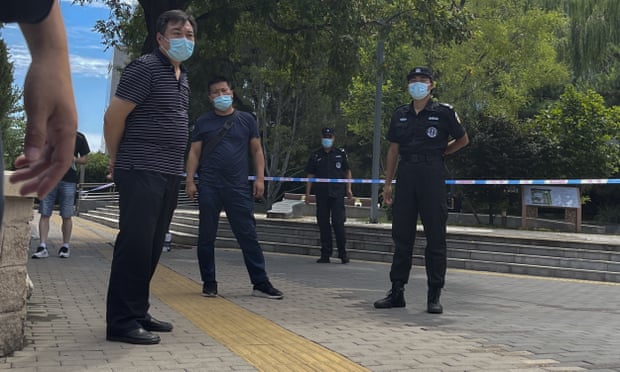The woman at the centre of a landmark case in China’s #MeToo movement has vowed not to give up after a court rejected her appeal for an apology and damages.
In 2018 Zhou Xiaoxuan accused a high-profile state TV presenter, Zhu Jun, of forcibly kissing and groping her during a 2014 internship. The case inspired many others to share their experiences of sexual assault and caused a social media storm.
On Wednesday the court in Beijing ruled after a closed-door hearing that evidence submitted by the 29-year-old was “insufficient” in proving alleged sexual harassment. Last year a court ruled against her on similar grounds, prompting her to appeal.
“I’m disappointed but it’s also somewhat expected,” Zhou told the Guardian shortly after hearing the result. “I won’t give up, but I also don’t know what to do next. We seem to have exhausted all the legal means.”

Zhou said the decision had also dealt a further blow to the country’s #MeToo movement. After flourishing briefly in 2018 following the Harvey Weinstein scandal, it has since been largely shut down. Activists found their online posts censored and faced pressure from authorities when trying to hold protests.
In a video she posted online on Tuesday, Zhou said she had no regrets about pursuing the case. “I really hope that people don’t have to suffer in the future,” she said. “I hope things will be easier for the next victim who enters legal procedures.”
Police and plainclothes officers in Beijing cordoned off long stretches of pavement outside the Beijing No 1 intermediate people’s court before her arrival on Wednesday morning, with officers logging the details of passersby.
Zhou said before returning to court that her legal team would focus on getting access to more evidence, such as police transcripts of interviews with her parents after she reported the incident – which were not included in the earlier trial – and surveillance footage.

Zhou said Zhu was absent from earlier proceedings, and that while he had sued her for defamation, she was not aware of further developments in that case.
A small group of supporters came to wish Zhou good luck on Wednesday, holding up signs that said “MeToo” and balloons spelling out “All the best” in Chinese.
“Four years have passed, and the most important thing is that we have raised this question: when a woman encounters sexual harassment in a closed space, is her pain worth paying attention to?” Zhou said to supporters. “There may be no answer today, but the most important thing is that we put this question here.”
Zhou, also known by the pseudonym Xianzi, originally sued for a public apology from Zhu and 50,000 yuan ($7,400) in damages. Her first hearing in December 2020 drew a large crowd and a significant police presence in Beijing. Reporters from foreign media outlets including AFP were dragged away by police while filming the scene.
“The process for my case has truly been too difficult,” Zhou told Agence France-Presse before her appeal. “I worry that other victims fear standing up for their rights after seeing what I’ve experienced.”
But she added that with her case, “perhaps the next victim that walks into court can receive more trust”.
Sign up to First Edition, our free daily newsletter – every weekday morning at 7am BST
Her case against Zhu was originally filed under the “personality rights” law – covering rights relating to an individual’s health and body. But her lawyers later asked for it to be considered under a sexual harassment law that was passed in 2020.
Despite that law, many women in China are still reluctant to report harassment, and it is rare for cases to make it to court in a legal system that places a heavy burden on the claimant.
The country’s #MeToo movement has stumbled since 2018, when a wave of women published allegations of sexual harassment against university professors. Threatened at the time by the prospect of an uncontrolled mass movement, internet censors quickly began blocking social media hashtags and keywords.
“Deep down, I am very disappointed. But perhaps at this stage and in such a case, the fact that I lost the battle could provoke more reflection on the real difficulty of being a woman in today’s China,” Zhou told the Guardian. “That’s probably the real meaning of my legal case.”
Additional reporting by Agence France-Presse and Associated Press


